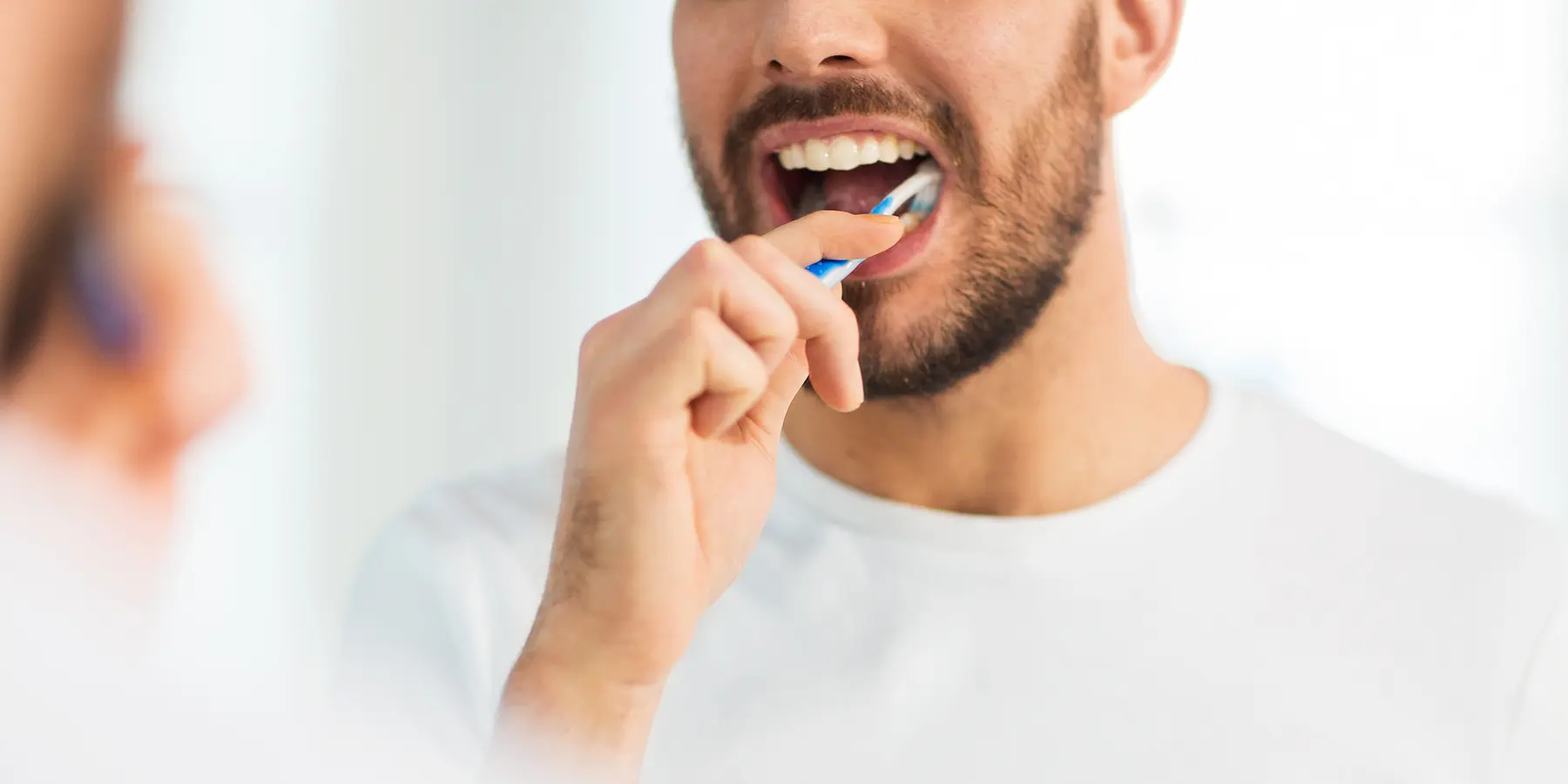Reviewed By Dr. Jeffery Kesecker, DDS
Reading Time: 4 minutes
If you have dental implants, you have made a major investment in your smile. But like any investment, it needs the right care to last.
In this blog, you will learn how to clean dental implants, what tools to use, and common mistakes to avoid.
Legacy Surgery offers dental implants in Harrisonburg and Staunton, VA.
Table of Contents
Key Takeaway
Dental implants may not decay, but the bone and gum tissue around them can still be damaged by bacteria and bad habits. Daily cleaning, the right tools, and regular checkups are essential if you want your implants to stay healthy and last for life.
What’s at Risk if You Don’t Take Care of Your Implants
The implant is made of titanium, and the artificial tooth (dental crown) is made from decay resistant material, so neither can decay. But the gum tissue and bone around them are still very much alive and vulnerable.
If you don’t clean thoroughly, bacteria can build up at the gumline, leading to peri-implantitis, a serious infection that causes bone loss and can lead to implant failure.
Daily care protects the foundation your implant depends on.
Daily Cleaning Routine For Dental Implants
Dental implants need consistent, thorough cleaning to stay healthy and last as long as possible.
Brushing
Brush your dental implants at least twice a day using the right tools.
- Use a soft-bristled toothbrush: Hard bristles can damage the gum tissue around the implant.
- Use low-abrasive toothpaste: Choose toothpaste that does not scratch or wear down the surface of the implant crown or surrounding natural teeth.
- Angle your brush correctly: Hold the toothbrush at a 45-degree angle to clean along the gumline, where food particles and plaque buildup can occur.
- Electric toothbrush or angled-neck toothbrushes can help: These are effective at reaching hard-to-reach areas around the implant and neighboring teeth.
Flossing
Flossing removes debris and plaque between the implant and adjacent teeth.
- Floss daily: Floss at least once a day to prevent plaque and food debris from building up along the gumline.
- Use implant-specific floss, bridge floss, or traditional floss: Some flosses are designed specifically for implants, with wider, spongy textures to clean better.
- Gently guide the dental floss: Wrap the floss around the implant crown and gently move it up and down without snapping.
Water Flossers and Oral Irrigators
Water flossers are effective tools for flushing out bacteria from hard-to-reach areas.
- Aim at the gumline: Direct the stream where the implant meets the gum tissue.
- Use daily: Integrate into your oral care routine for better interdental cleaning.
- Oral irrigators help with sensitive teeth: These are ideal for patients who struggle with traditional flossing methods.
Don’t Skip Professional Cleanings
Regular cleanings are non-negotiable for implant care. You should visit your dentist every three to six months for professional cleanings.
Dental hygienists use specialized tools that protect implant surfaces and natural tooth structure while removing plaque and tartar. Regular checkups also allow early detection of gum inflammation or implant-related complications.
| The Bottom Line on Implant CareImplant care isn’t complicated, but it does take consistency. Stick to soft brushes, non-abrasive toothpaste, daily flossing or water flossing, and regular checkups to keep your implants healthy long-term. |
Helpful Tools That Make Cleaning Easier
The right tools can make a big difference in how well you clean around your implant.
- Interdental brushes: Great for cleaning tight spaces between your implant and neighboring teeth.
- Implant-specific brushes: Smaller brush heads allow better access around the crown and implant base.
- Low-abrasive, tartar control toothpaste: Gentle on implant surfaces and surrounding teeth. Don’t use toothpaste marketed as whitening or brightening.
- Water flossers: Flush out plaque and food where string floss might miss.
- Alcohol-free antibacterial mouthwash: Helps control bacteria without irritating your gums.
Mistakes to Avoid with Dental Implants
Daily cleaning is essential, but it’s not the only factor in keeping your implants healthy. Certain habits can weaken or damage the implant over time. Watch out for these common mistakes:
- Chewing on ice or hard objects: This can chip or crack the crown or damage surrounding teeth.
- Smoking: Smoking reduces blood flow, increases inflammation, and raises the risk of implant failure.
- Using your teeth as tools: Don’t use your teeth to open bottles, tear packaging, or bite nails.
- Grinding or clenching: Excess pressure from bruxism can stress the implant and surrounding bone.
- Ignoring your night guard: If you’ve been given one, wear it! It protects both implants and natural teeth while you sleep.
Schedule a Dental Implant Consultation in Harrisonburg, VA
If you would like to learn more about dental implant care or are considering implants, schedule a consultation with Dr. Kesecker at Legacy Surgery.
To book an appointment at our oral surgery office in Harrisonburg, VA, call (540) 437-1230 or visit us at 2071 Pro Pointe Lane, Harrisonburg, VA.
📍Other location
(540) 213-8750
110-C Mactanly Pl., Staunton, VA 24401.
FAQs About Cleaning Dental Implants
Does food get trapped under dental implants?
Yes, food can become trapped around the base of dental implants, especially near the gumline or between neighboring teeth. Flossing helps to remove food particles that get trapped around the implant, so don’t skip that step in your oral hygiene routine!
Do dental implants require special cleaning?
They don’t necessarily require “special” cleaning, they require regular cleaning. You clean them just like you do your natural teeth: brush twice a day, floss at least once a day. The implant and artificial tooth are resistant to decay, but the gum and bone are not! Just like regular teeth, a good oral hygiene routine is important!
What is the best thing to clean implants with?
The best tools include a soft toothbrush, low-abrasive toothpaste, implant-specific floss, interdental brushes, and water flossers. These allow for thorough cleaning without damaging the implant or gum tissue.

